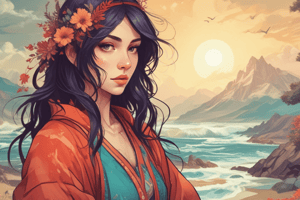Podcast
Questions and Answers
What is a characteristic feature of Postmodern Literature?
What is a characteristic feature of Postmodern Literature?
- Using only one narrative perspective
- Following a strict chronological order
- Including only serious themes
- Mixing various storytelling techniques (correct)
How might a writer in Postmodern Literature play with the structure of a story?
How might a writer in Postmodern Literature play with the structure of a story?
- By presenting the story in a linear progression
- By writing it in a traditional format
- By excluding any humor from the narrative
- By altering the order of events or telling it backward (correct)
What is a common theme that Postmodern Literature often explores?
What is a common theme that Postmodern Literature often explores?
- The exploration of different perspectives on the same event (correct)
- The necessity of a defined beginning and end
- The clear distinctions between reality and fiction
- The predictability of story outcomes
What can readers expect regarding endings in Postmodern Literature?
What can readers expect regarding endings in Postmodern Literature?
Why might a character in Postmodern Literature talk about being in a book?
Why might a character in Postmodern Literature talk about being in a book?
What role does humor often play in Postmodern Literature?
What role does humor often play in Postmodern Literature?
In what way are Postmodern Literature's storytelling styles often described?
In what way are Postmodern Literature's storytelling styles often described?
What metaphor describes Postmodern Literature in terms of creativity and structure?
What metaphor describes Postmodern Literature in terms of creativity and structure?
Flashcards are hidden until you start studying
Study Notes
Characteristics of Postmodern Literature
- A blend of diverse ideas, narratives, and styles that challenge conventional storytelling methods.
- Narrative structures may include non-linear timelines, such as reverse storytelling or intentional disorganization of events.
Unique Storytelling Techniques
- Combines serious themes with humor or absurdity, creating unexpected juxtapositions within the narrative.
- Characters often engage with the notion of their fictionality, prompting readers to distinguish between reality and imagination.
Perspective and Point of View
- Employs multiple viewpoints, allowing for varied interpretations and experiences of the same event.
- Encourages readers to consider how perspective shapes narrative understanding.
Open-Ended Narratives
- Frequently lacks a definitive conclusion, leaving room for interpretation and personal reflection on the story's outcome.
- Emphasizes the journey of reading over traditional story resolution, inviting readers to explore possibilities.
Thematic Exploration
- Engages in philosophical questions surrounding existence, authenticity, and the nature of storytelling itself.
- Creates an adventurous reading experience through innovative and playful narrative techniques.
Studying That Suits You
Use AI to generate personalized quizzes and flashcards to suit your learning preferences.





